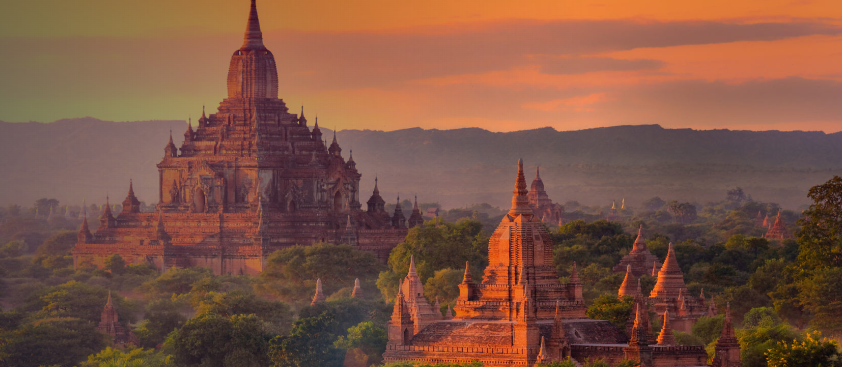
Except for a “news flash” last week, the tragic story of beautiful Myanmar (formerly known as Burma and a name still formally used by the U.S. government) seems to have been largely ignored or just plain forgotten during the past three years.
The event that briefly grabbed some minor headlines was the news that the Myanmar National Democratic Alliance Army (MNDAA) had “seized control of a major regional military headquarters near the border with China, in what could be the biggest recent defeat for a ruling junta that is battling to contain a widening revolt.”
The MNDAA is one of several ethnic minority groups and militias who have been fighting the well-equipped military junta for the past five decades.
In 1962, a military junta seized power and has held the country under authoritarian rule since, except for a “decade of tentative democracy.”
That decade began in 2011 when the country started transitioning toward democracy with 1991 Nobel Peace Prize laureate Aung San Suu Kyi at the helm.
In 2015 Suu Kyi led the National League for Democracy (NLD) party to victory, despite the junta’s efforts to intimidate, threaten and vilify her.
Subsequently Suu Kyi held several ministerial posts in the government and was eventually named state counselor, a post newly created by the legislature, which made her the de facto leader of Myanmar.
That decade of tentative democracy was shattered in February 2021 when the military junta staged a coup d’état, ousted the elected government of Suu Kyi, declared a state of emergency, reinstated its suppressive rule and plunged Myanmar into renewed and more widespread violence that has morphed into a violent civil war.
Suu Kyi was charged with multiple fabricated charges including treason and corruption and was sentenced to 27 years in prison. In 2022, the military regime added another seven years to Suu Kyi’s sentence based on equally sham charges.
There are reports that she was recently moved from prison and placed under house arrest at an unknown location. Not a new situation for Suu Kyi who, between 1989 and 2010, spent nearly 15 years under house arrest, albeit the tone of the latest “house arrest” report is somewhat worrisome.
Suu Kyi’s reputation as a beacon for human rights, a champion of democracy and a symbol of peaceful resistance was somewhat tarnished when she failed to condemn the 2017 massacres by the military of the Muslim minority Rohingya population in Myanmar. A massacre that has been formally labelled a genocide by the U.S. State Department.
Nevertheless, she is still highly revered in Myanmar.
The 2021 military coup led to a reign of terror, a human rights catastrophe.
Since the coup, thousands of civilians have been killed. Nearly three million people have been internally displaced and about 18.6 million Myanmar people (one third of Myanmar’s entire population) are in desperate need of humanitarian assistance.
Today, what was once a serene tropical paradise, a shimmering land of hills, valleys, rivers and waterfalls dotted with thousands of golden pagodas, temples and stupas is now a tortured land littered with thousands of IEDs, landmines and unexploded ordinance.
Already in September 2021, only six months after the coup, experts at the Council of Foreign Relations were calling Myanmar “a failing state.”
Three years hence, Myanmar is, to put it mildly, teetering “on the brink of becoming a failed state.”
A good Myanmar friend who witnessed the first few months of resistance to the coup before leaving Myanmar tells me about the bravery and love for democracy especially among young people. Young men and women who continue to fight the brutal military despite lack of experience, support and weapons.
He then asks me, “Why doesn’t the United States, the world, pay more attention to the situation in Myanmar?”
I could not answer the question but did some research.
While the U.S. and other allies have imposed financial, diplomatic and trade sanctions (especially on arms) on Myanmar and its regime, and while a significant amount of humanitarian assistance has been provided to the people of Myanmar, the military continues to demonstrate dogged resilience and has proven to be “cunningly effective, if highly brutal, in maintaining power.”
An excellent piece at the Brookings Institution describes the complex, fragmented internal environment in a country that is having “the world’s longest civil war” and the fractured external environment, especially China’s and Russia’s devious and self-serving roles. The author, Mike Walker, perceptively points out that “Myanmar’s junta doesn’t have to ‘win,’ it just has to wait.”
On the other hand, the people of Myanmar who have endured so much turmoil, violence and suffering practically since gaining independence from Great Britain 76 years ago cannot wait much longer.
The international community must do more, much more than pass resolutions, issue “statements of support,” “expressions of deep concern,” and condemnations of the regime.
In March 2022, one year after the military coup, Secretary of State Antony J. Blinken, referring to the atrocities committed by the Myanmar military regime against Rohingya and on all of Myanmar since the coup, solemnly promised, “The day will come when those responsible for these appalling acts will have to answer for them.”
Two years and five months hence that day still has not come.
And another “news flash” today from Reuters: “Myanmar’s embattled military government extended a state of emergency on Wednesday for another six months,” something the junta has done every six months since the coup.
CODA: Please read about the “three immediate, practical steps” the world can take to help Myanmar in a 2023 piece by Benedict Rogers, the co-founder and CEO of Hong Kong Watch, HERE.
















